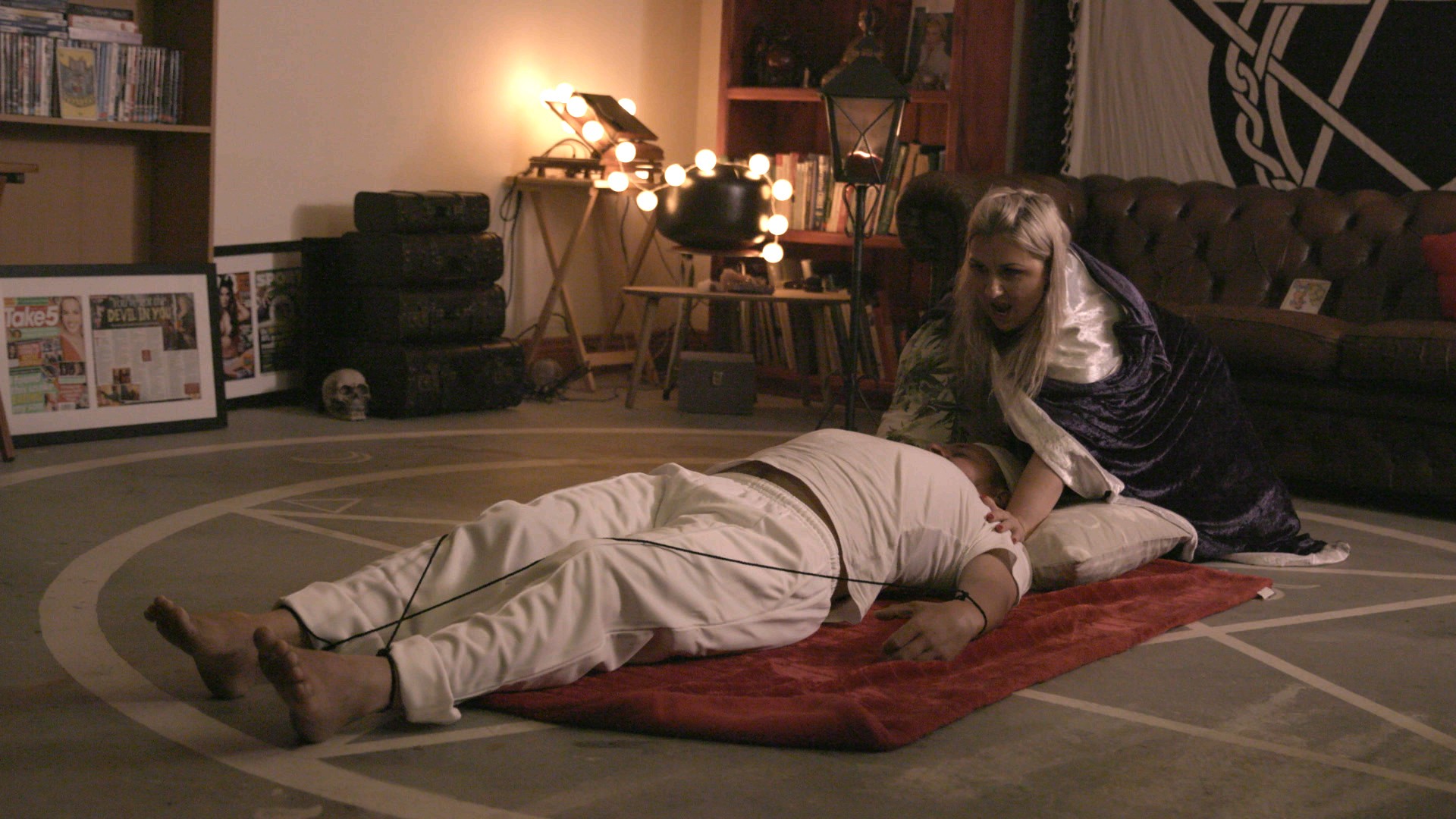For a look at the Queenslander who says he's Jesus, or the Japanese cult that allegedly detonated a nuke in WA, check out Your 2017 Guide to Cults and Fringe Religions.When you hear the word "cult," don't think of Jonestown. Don't think of Philip Seymour Hoffman in The Master, don't think of Xenu. Cults aren't just the stuff of weird late night Wikipedia deep dives, and in real life they rarely require their members to wear robes or make suicide pacts. You probably know someone who has unwittingly toyed with the idea of joining a cult or cult-like group, or even someone who's been successfully sucked in."Cults are absolutely more prevalent and more subtle and more sophisticated than most people think," says Ros Hodgkins, founding member of the Australian cult support service Cult Information and Family Support Inc (CIFS). "They don't appear on the outside as anything to worry about."Having spent nearly three decades as a cult consultant, Hodgkins is understandably wary of journalists ringing her up to ask about Children of God or the Family. Receiving hundreds of requests for help from cult victims and their concerned family members each year, the staff at CIFS will tell you that cults aren't nearly as wacky or outwardly sinister as we're led to believe through pop culture. But they're still incredibly common, and can cause their members severe psychological damage."When we think of cults we think of communes, of people going off somewhere and forming a group like that, wearing Hare Krishna-type clothes," says Hodgkins. But as the cultural obsession with Jonestown-like groups has grown, she points out, cults have had to get smarter to survive. Leaders now know they have to blend into society in order to trick people into leaving it, and even Hare Krishnas "often wear plain clothes now."In the early 1990s, Hodgkins' daughter was recruited by a "Christian" cult that operated on her university campus and preyed on vulnerable new students from rural areas who were lonely and looking for friends. "Because people weren't interested in joining something that looked like a cult, we now get groups offering something that looks really good from the outside," she explains. "We call it the 'tasty outer layer.'"
WATCH: Inside the Family, Australia's strangest cult
Hodgkins says there are hundreds of cult groups operating in Australia right now. On the surface, many of them appear totally benign, but will happily rob recruits of their money, community, and independence. Anyone is vulnerable to cult recruitment ("We've all been isolated or sad at some point") so the key to avoiding cult-like situations is to understand how these mind-controlling groups operate. Typically, cults will lure members in promising to teach members techniques for self-improvement or altruism—not necessarily with a veneer of tacked on spirituality, or a super charismatic Jesus leader."Pyramid schemes, marketing schemes about how to be a successful person… Some of these types of groups can be good, but some of them lock you in. You must ascend to the next level, do the next course. And if you're not successful, it's your fault," explains Hodgkins. "Soon you're cut off from everything."The internet offers opportunistic cult groups a million opportunities to lure vulnerable people in. Hodgkins describes ISIS and the alt right as cults. Currently, CIFS is researching ways to help the friends and family members of radicalised youth who lose their way online. In fact, ISIS' recruitment techniques are so similar to those used by other cults the most recent European Federation of Centres of Research and Information on Cults and Sects (FECRIS) conference focused specifically on radicalisation."Looking at the ISIS situation, it's actually so similar to groups you'd find at New Age festivals or being recruited online or whatever," Hodgkins says. "Young people are going along for the music, for the camaraderie, for the friendships, for belonging. Then their personal freedoms and families are taken away."In your traditional Jonestown-esque cult, members are physically prevented from leaving the commune and become brainwashed by an intensely charismatic leader who seeks money or power. But contemporary cults are more nebulous, Hodgkins explains, and while they don't always hook people in for life they can cause long term damage to someone's happiness. CIFS regularly interacts with former cult members with severe mental health problems, and suicides are "incredibly common."
WATCH: Meet Lizzy Rose, Australia's suburban exorcist mum
"In many cult groups now people have the ability to leave. But when they leave, they're lost. They've been taken in, have given a lot of money, have given up their freedom," Hodgkins says. "So when people leave they aren't actually able to survive in society. That causes huge practical and psychological problems."While we may conceive of cult members as completely brainwashed or crazy, Hodgkins says it's very common that cult members will begin to question the methods of their group while still subscribed to it. Of course, voicing their concerns will risk being ostracised or exiled, which can have terrible consequences. "Being asked to leave is terrible when you still believe in the cause," she explains. "It feels like you're being cast out into utter darkness."If your friend or family member becomes a cult victim, maintaining loving and constant contact is incredibly important. "Let them be free to talk about their experiences within the group while subtly asking them questions rather than telling them what they should be thinking. Show them unconditional love," Hodgkins says.In a world filled with megachurches, Crossfit gyms, Pepe-heavy Reddit forums, and multilevel marketing schemes, it's crucial to expand your definition of mind control. Jonestown was scary, but YouTube recruiters can be scarier."We have to look at the dynamics of mind control in a broader aspect, not just a few wacky cults that have existed over time," says Hodgkins. "We have to be able to asses how not to be recruited, so these groups do not become as powerful."Follow Kat on TwitterMore from Your 2017 Guide to Cults and Fringe Religions:
Advertisement
Advertisement
WATCH: Inside the Family, Australia's strangest cult

Hodgkins says there are hundreds of cult groups operating in Australia right now. On the surface, many of them appear totally benign, but will happily rob recruits of their money, community, and independence. Anyone is vulnerable to cult recruitment ("We've all been isolated or sad at some point") so the key to avoiding cult-like situations is to understand how these mind-controlling groups operate. Typically, cults will lure members in promising to teach members techniques for self-improvement or altruism—not necessarily with a veneer of tacked on spirituality, or a super charismatic Jesus leader."Pyramid schemes, marketing schemes about how to be a successful person… Some of these types of groups can be good, but some of them lock you in. You must ascend to the next level, do the next course. And if you're not successful, it's your fault," explains Hodgkins. "Soon you're cut off from everything."The internet offers opportunistic cult groups a million opportunities to lure vulnerable people in. Hodgkins describes ISIS and the alt right as cults. Currently, CIFS is researching ways to help the friends and family members of radicalised youth who lose their way online. In fact, ISIS' recruitment techniques are so similar to those used by other cults the most recent European Federation of Centres of Research and Information on Cults and Sects (FECRIS) conference focused specifically on radicalisation.
Advertisement
WATCH: Meet Lizzy Rose, Australia's suburban exorcist mum

"In many cult groups now people have the ability to leave. But when they leave, they're lost. They've been taken in, have given a lot of money, have given up their freedom," Hodgkins says. "So when people leave they aren't actually able to survive in society. That causes huge practical and psychological problems."While we may conceive of cult members as completely brainwashed or crazy, Hodgkins says it's very common that cult members will begin to question the methods of their group while still subscribed to it. Of course, voicing their concerns will risk being ostracised or exiled, which can have terrible consequences. "Being asked to leave is terrible when you still believe in the cause," she explains. "It feels like you're being cast out into utter darkness."
Advertisement